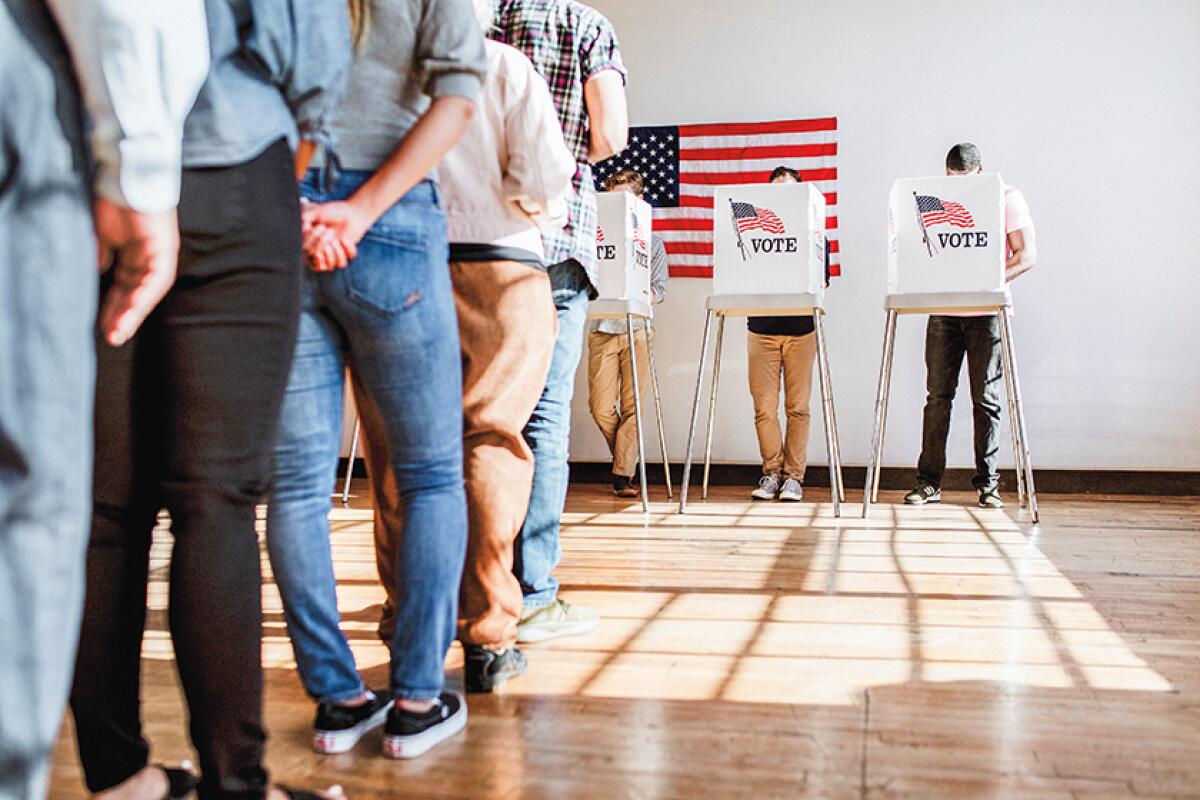ABA Survey Finds Support for Election Holiday, Expanded Polling Hours, Voter ID

- Share via
Most people in the United States support creating a federal holiday for voting, expanding hours at polling stations and requiring an identification card to vote, shows a new survey by the American Bar Association.
Those results are from the 2022 American Bar Association Survey of Civic Literacy - the fourth annual survey conducted as part of Law Day. The occasion on May 1 is a day marking the role of law in the United States. The theme for this year’s observance was “Toward a More Perfect Union: The Constitution in Times of Change.”
A nationally representative survey of 1,000 adults was conducted in English and Spanish by telephone March 2-7 of this year. The survey assessed public knowledge of laws and principles underlying U.S. democracy, plus public opinion of law-related current events, particularly on voting, ballot access and racial justice.
“The ABA Civic Literacy Survey results indicate that most of the public believes that voting is a key part of participating in our democracy,” ABA President Reginald Turner said. “Our system of government relies on participation by the people as they exercise the most important of our legal rights: the right to vote in a free and fair election.”
The survey posed questions on voting rights, racial justice and basic civic literacy. Among the highlights:
Voting
• Holiday for voting: Two-thirds support creating a federal holiday for voting in federal elections. Only 27% oppose the idea.
• Voting procedures: Strong majorities support expanding the hours at polling stations (80%), requiring a person to provide ID before voting (79%) and increasing the number of polling stations in their district (78%). A majority also support increasing the use of ballot drop boxes (59%), allowing drive-through voting (58%) and instituting same-day voter registration on Election Day (55%).
• Ease of voting: More than a third of those polled (38%) said their state has enacted laws, making it easier to vote since 2020. One-fifth (21%) said the state has enacted laws making it harder to vote.
• Voting frequency: Asked how often they vote, more than half (59%) said “always” and 29% said “most of the time.” Just 10% said “occasionally” and 2% said “never.”
• Why we vote: Among those who said they vote “always” or “most of the time,” a majority said they do so because “it is my civic responsibility” (68%), “elections matter to the future of the country” (58%), and “I believe my vote makes a difference” (53%). Less than half (42%) said they vote because of “my support of candidates.”
• Why we don’t vote: Among those who said they vote “occasionally” or “never,” nearly half (42%) said “candidates don’t motivate me,” and 31% said “I don’t believe my vote makes a difference.”
• Making a difference: Nearly half of those polled (42%) said they have “some” confidence that their vote makes a difference. A third said they have “a lot” of confidence about making a difference and a quarter said they have “not much” confidence or “no confidence.”
Racial Justice
• Racial bias: A majority (52%) agreed with the statement “The justice system has racial biases built into its rules, procedures and practices.” While majorities of Black people (75%), Hispanic people (54%) and people 18 to 34 (63%) agreed - under half (48%) of white people and 40% of people aged 65 and older agreed.
• Rule of law: A majority (55%) agreed with the statement “The nation’s judicial system adheres to the rule of law, under which all individuals are treated equally in the eyes of the law.” Support was strongest among Hispanic people (61%), white people (59%) and people age 65 and older (65%). It was weakest among Black people (29%) and people age 18 to 34 (46%).
Civic Knowledge
• Presidential line of succession: 70% knew that the Speaker of the House is second in line for the presidency.
• First Amendment: 60% knew that the right to vote is not part of the First Amendment.
• Obeying the law: 17% incorrectly thought that obeying the law is a responsibility only for U.S. citizens.
• Freedom of speech: 22% incorrectly thought that freedom of speech is a right only for U.S. citizens.
• Supreme Court: 57% correctly identified John Roberts as chief justice, while 13% thought it was Clarence Thomas, 9% said Sonia Sotomayor and 8% believed it was Amy Coney Barrett.
To see all the survey results, visit ambar.org/civicsurvey.
The ABA is largest voluntary association of lawyers in the world. As the national voice of the legal profession, the ABA works to improve the administration of justice, promotes programs that assist lawyers and judges in their work, accredits law schools, provides continuing legal education, and works to build public understanding around the world of the importance of the rule of law.